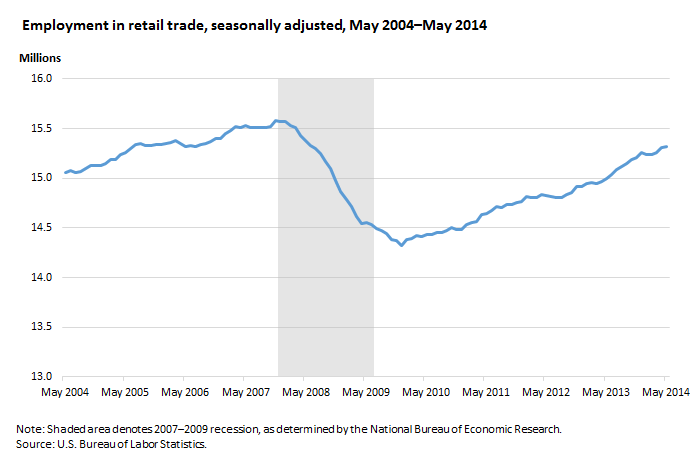Last week I had the pleasure to speak with an important group of leaders who represent both key users and vital providers of BLS data. This talk was with the National Retail Federation at their meeting of chief financial executives. The National Retail Federation is a trade association for discount and department stores, home goods and specialty stores, local merchants, grocers, wholesalers, chain restaurants, and Internet retailers from the United States and abroad.
I reviewed the importance of retailing in the U.S. economy. There were 15.3 million jobs in retail trade in the United States in May 2014. Although employment in the industry has been growing since early 2010, it still hasn’t quite reached its peak employment level of 15.6 million just before the 2007–2009 recession began. 
Retail trade accounts for about 11 percent of nonfarm employment, which means the industry is slightly larger than leisure and hospitality and also larger than manufacturing, construction, wholesale trade, financial activities, and information. Of course, the health of the retail trade industry is closely tied to the health of these other industries.
We also talked about the heavy use that retailers make of statistics from BLS and the other federal agencies. Information on employment and unemployment, for example, helps retailers forecast sales and adjust inventories. Data on consumer and producer prices help retailers forecast their costs and adjust the prices they charge. Pay and benefits statistics help retailers determine the compensation levels they provide to their employees and forecast the spending levels of potential customers. Information on safety and health helps retailers ensure that their workplaces are safe.
BLS could not provide any of this essential information—which firms rely on to stay competitive—without the cooperation of respondents to our surveys. Nearly all of our surveys are voluntary, meaning that the individuals, households, and organizations selected for our survey samples can choose whether to participate. We’re very grateful that so many agree to participate. I spoke to the retailers about how the confidentiality of survey responses is strictly protected by law and BLS security policies. I also emphasized how BLS strives to simplify participation in our surveys by designing questions that are easy to understand and require the least possible amount of time to answer. I enjoyed my lively discussion with members of the National Retail Federation and look forward to working with them and similar groups to strengthen the U.S. statistical system and learn how to serve the needs of our customers better.
 United States Department of Labor
United States Department of Labor